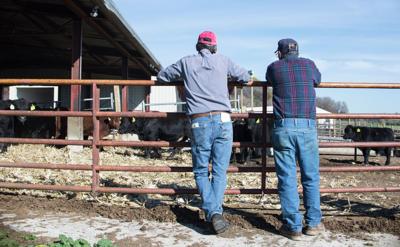Seventy bulls participating in the annual St. Croix Valley Bull Test are spending the next four months at the Mann Valley Farm just west of River Falls.
The bulls arrived at the campus farm, run by UW-River Falls, on Nov. 5. All animals live in the same environment and eat the same feed for 112 days.
The test is set up as a competition.
“There’s a lot of variables that can take place while they’re here,” said Harry Larsen, laboratory farm associate. The test aims to pick out those animals that do the best genetically.
Larsen is in charge of the day-to-day care of the animals at the farm.
During the test, the bulls are divided by size.
Bulls of the Black Angus breed, the breed with the most animals participating, compete against each other.
All other breeds, such as Hereford or Normande, compete in the same category. To participate, all bulls must be registered with their breed association and enrolled in their breed association’s herd improvement records.
The bulls have a two-week warm-up period before their first weigh-in on Nov. 17 and 18. The bulls are then weighed every 28 days.
In April, the bulls are given an index based 75 percent on their average daily gain over the period of the test, and 25 percent on their weight per day of age figured back to birth.
The bulls that have done the best, usually around 40 or 50, will be sold in an auction held at the Mann Valley Farm on April 15.
Consigners come from as far as Iowa Falls, Iowa, and Burlington, Wisconsin. It costs around $300 per bull entered in the sale and $35 to enter the lottery. The average bull is sold for $3,500-$4,000 at the auction, but some have been sold for as high as $10,000.
Several costs are deducted from the sale price to cover what UWRF has spent to house and feed the bulls as well as to get them ready for the sale. The consigner gets the rest of the money.
The UWRF beef management team also is involved in the bull test and sale. Jared Geiser, a sophomore, is the bull test chair of the beef management team. He is responsible for communication between the team, the bull test’s board of directors, and the lab farm.
Before the sale in April, team members clip and clean the animals. They also create videos of the animals for the online auction and hold an open house for the consigners and buyers a month before the sale.
Geiser said that working with the test benefits him by allowing him to make connections in the beef production industry. His position as the bull test chair gives him experience that he will need when working in the field after graduation.
Similar tests are done around the country. UW-Platteville holds one, as well as Purdue University in Indiana. The states of Minnesota and Iowa also have their own.
“We’d like to think the quality of the cattle that are here compare with any of the other bull tests around the country,” said Stacy Myers, chairman of the St. Croix Valley Bull Test board of directors. “A lot of the (artificial insemination) bulls that are used all over the United States are represented here in this pen. We hope to think the cows are just as good.”
The test has been held at UWRF’s Mann Valley for nine years. Before that, it was held at a farm in Menomonie, while only the sale was held at UWRF.
Consigners must apply to enter the sale. Past consigners are given first chance to enter, and others are put into a lottery. Past consigners are allowed to bring in up to six bulls, while newcomers can only bring one.
Myers said this was the first year in his experience that consigners were turned away.
Scott Ellevold of Deer Park is a new consigner this year.
“I just wanted to see how my bulls would perform with the rest of the bulls that were brought here,” he said.
Wayne Dewey drove three hours from Iowa Falls, Iowa, for the test and has been doing so for eight years. Of the other sales that Dewey could choose from, he said he continues to choose St. Croix Valley because he believes that it is set up better than others.
“The test is always approved out,” Dewey said. “They feed a high roughage instead of a high grain. They don’t actually push the bulls. They set a gain that they’re shooting for, so when they go back to pasture they can hold their weight.”
More information about the St. Croix Valley Bull Test is available online at scvbt.com.
Permission to republish this story is given by the author and Falcon News Service.



(0) comments
Welcome to the discussion.
Log In
Thank you for taking part in our commenting section. We want this platform to be a safe and inclusive community where you can freely share ideas and opinions. Comments that are racist, hateful, sexist or attack others won’t be allowed. Just keep it clean. Do these things or you could be banned:
• Don’t name-call and attack other commenters. If you’d be in hot water for saying it in public, then don’t say it here.
• Don’t spam us.
• Don’t attack our journalists.
Let’s make this a platform that is educational, enjoyable and insightful.
Email questions to mthorud@orourkemediagroup.com.